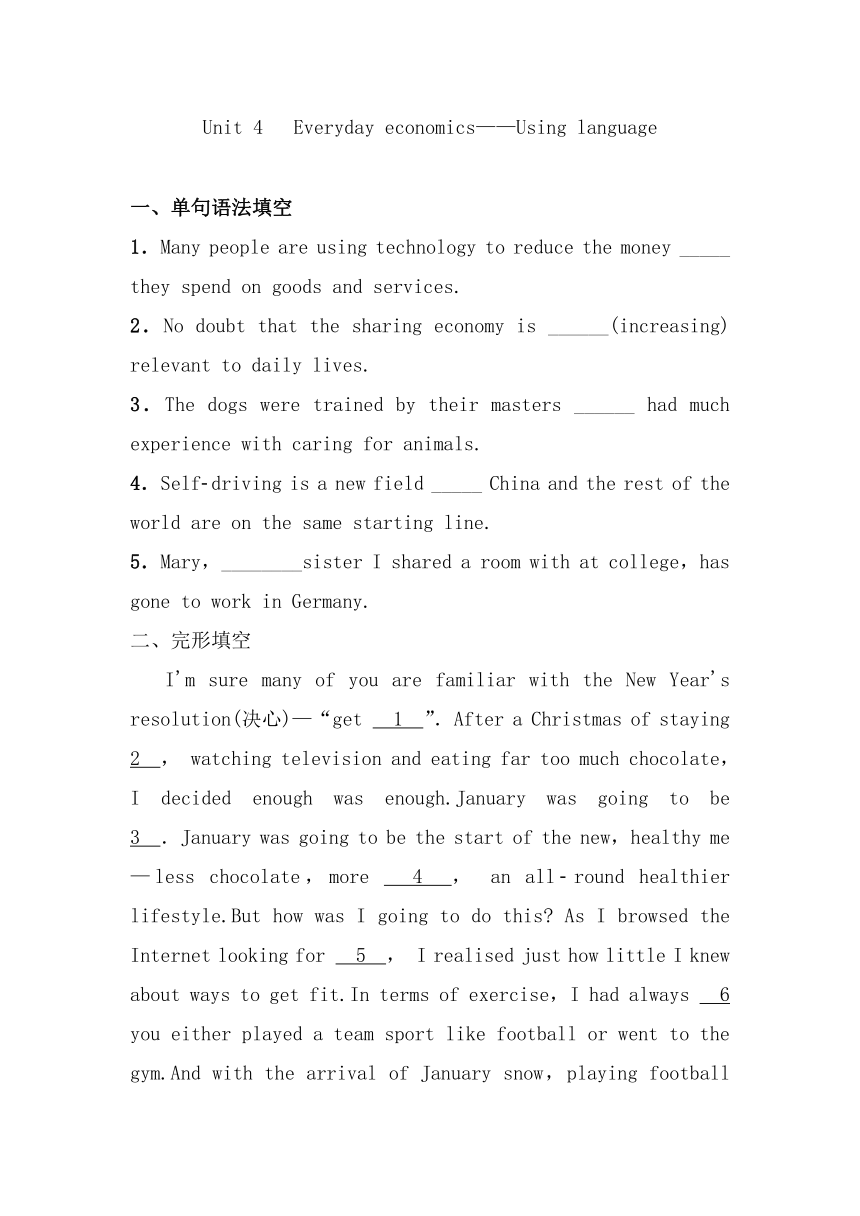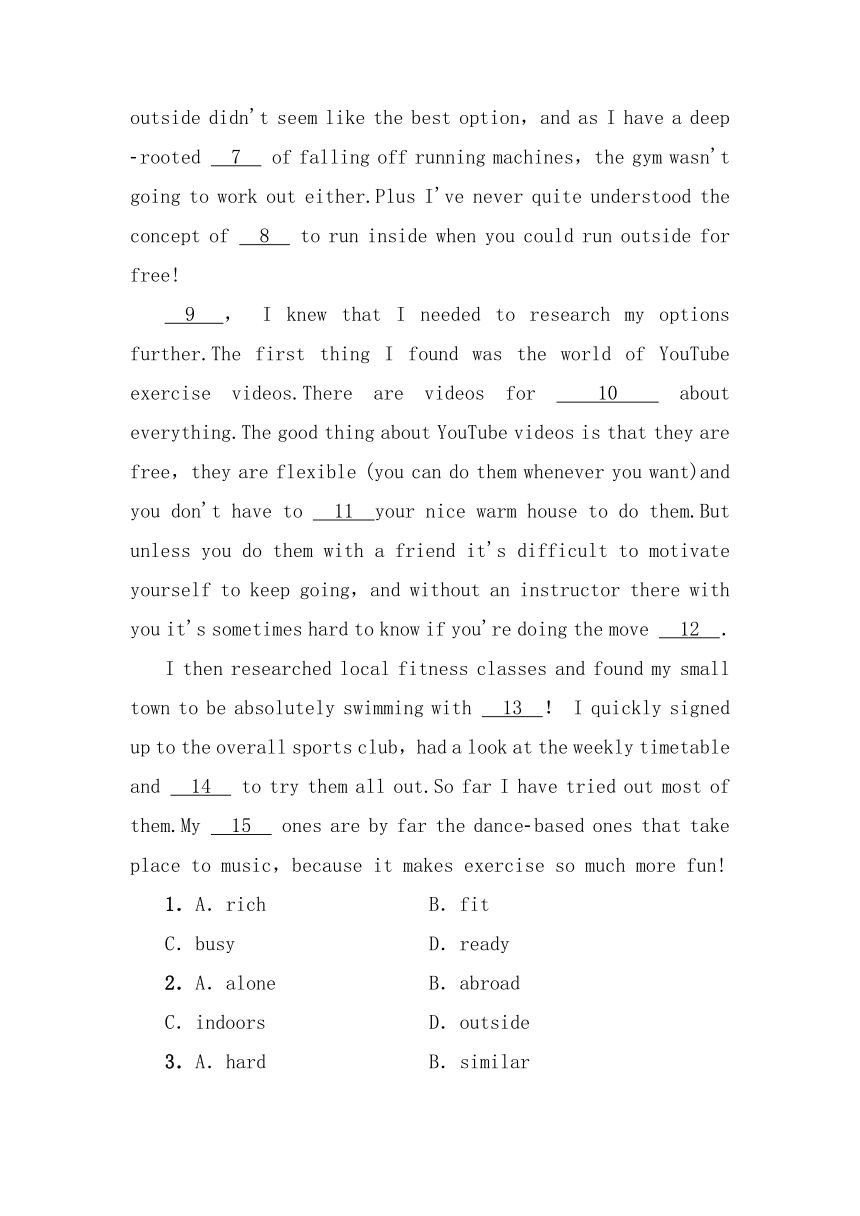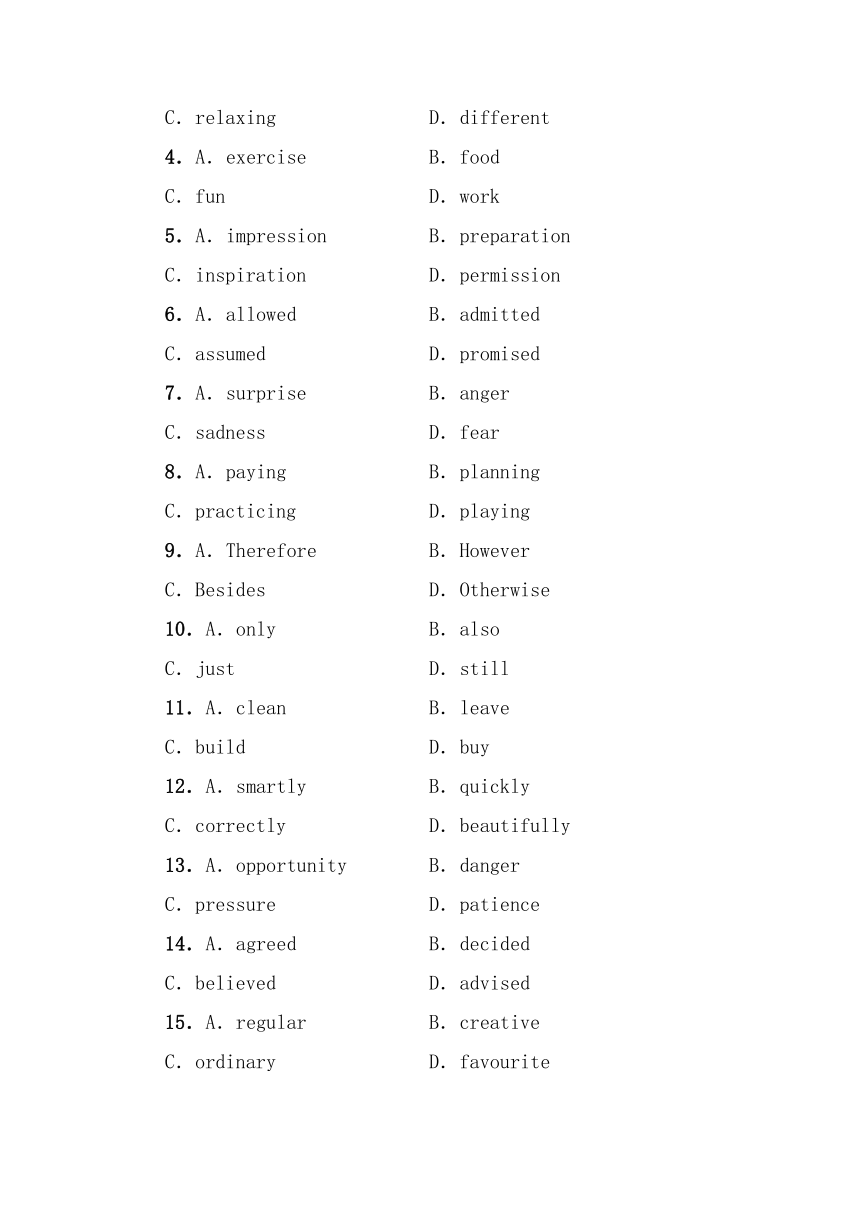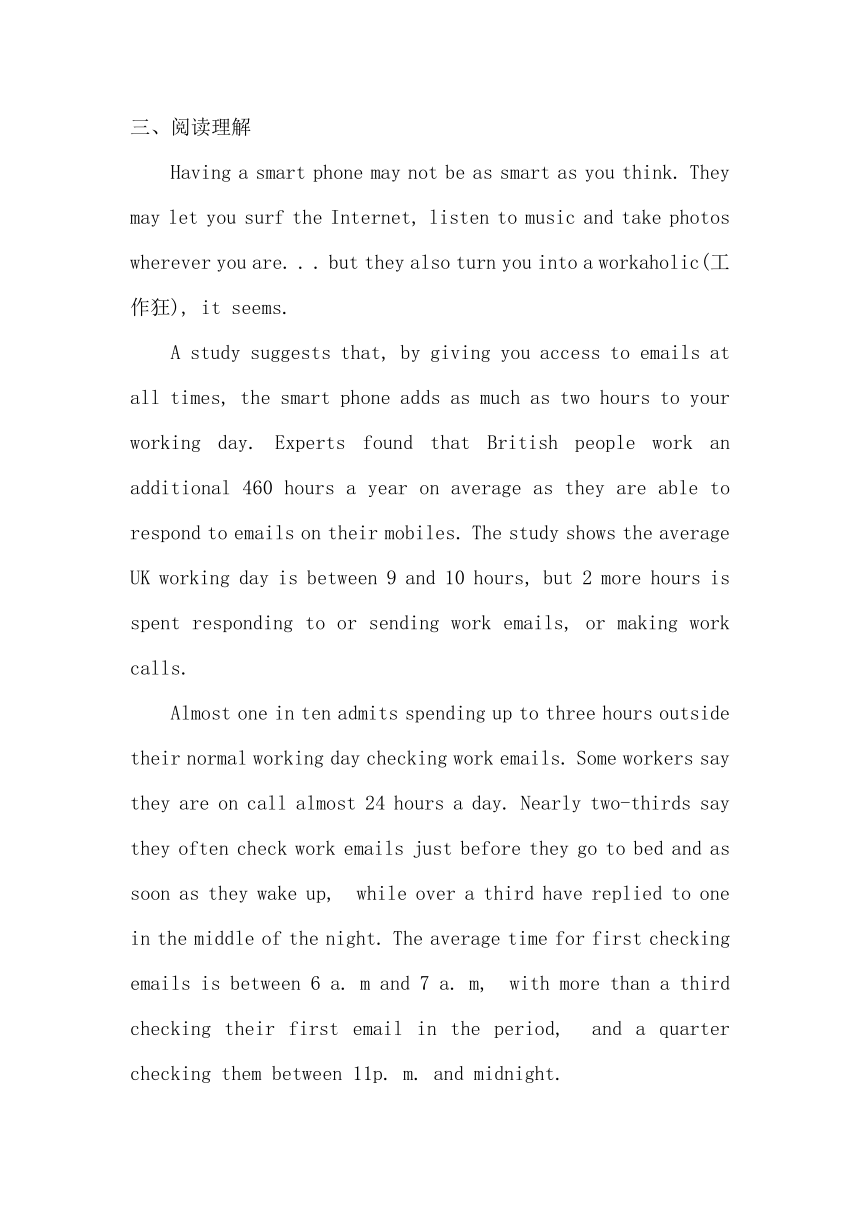外研版(2019)选择性必修第四册Unit 4 Everyday economics Using language同步检测练(含答案和解析)
文档属性
| 名称 | 外研版(2019)选择性必修第四册Unit 4 Everyday economics Using language同步检测练(含答案和解析) |  | |
| 格式 | zip | ||
| 文件大小 | 19.5KB | ||
| 资源类型 | 教案 | ||
| 版本资源 | 外研版(2019) | ||
| 科目 | 英语 | ||
| 更新时间 | 2022-01-27 13:10:23 | ||
图片预览




文档简介
Unit 4 Everyday economics——Using language
一、单句语法填空
1.Many people are using technology to reduce the money _____ they spend on goods and services.
2.No doubt that the sharing economy is ______(increasing) relevant to daily lives.
3.The dogs were trained by their masters ______ had much experience with caring for animals.
4.Self driving is a new field _____ China and the rest of the world are on the same starting line.
5.Mary,________sister I shared a room with at college,has gone to work in Germany.
二、完形填空
I'm sure many of you are familiar with the New Year's resolution(决心)—“get 1 ”.After a Christmas of staying 2 , watching television and eating far too much chocolate,I decided enough was enough.January was going to be 3 .January was going to be the start of the new,healthy me—less chocolate,more 4 , an all round healthier lifestyle.But how was I going to do this As I browsed the Internet looking for 5 , I realised just how little I knew about ways to get fit.In terms of exercise,I had always 6 you either played a team sport like football or went to the gym.And with the arrival of January snow,playing football outside didn't seem like the best option,and as I have a deep rooted 7 of falling off running machines,the gym wasn't going to work out either.Plus I've never quite understood the concept of 8 to run inside when you could run outside for free!
9 , I knew that I needed to research my options further.The first thing I found was the world of YouTube exercise videos.There are videos for 10 about everything.The good thing about YouTube videos is that they are free,they are flexible (you can do them whenever you want)and you don't have to 11 your nice warm house to do them.But unless you do them with a friend it's difficult to motivate yourself to keep going,and without an instructor there with you it's sometimes hard to know if you're doing the move 12 .
I then researched local fitness classes and found my small town to be absolutely swimming with 13 ! I quickly signed up to the overall sports club,had a look at the weekly timetable and 14 to try them all out.So far I have tried out most of them.My 15 ones are by far the dance based ones that take place to music,because it makes exercise so much more fun!
1.A.rich B.fit
C.busy D.ready
2.A.alone B.abroad
C.indoors D.outside
3.A.hard B.similar
C.relaxing D.different
4.A.exercise B.food
C.fun D.work
5.A.impression B.preparation
C.inspiration D.permission
6.A.allowed B.admitted
C.assumed D.promised
7.A.surprise B.anger
C.sadness D.fear
8.A.paying B.planning
C.practicing D.playing
9.A.Therefore B.However
C.Besides D.Otherwise
10.A.only B.also
C.just D.still
11.A.clean B.leave
C.build D.buy
12.A.smartly B.quickly
C.correctly D.beautifully
13.A.opportunity B.danger
C.pressure D.patience
14.A.agreed B.decided
C.believed D.advised
15.A.regular B.creative
C.ordinary D.favourite
三、阅读理解
Having a smart phone may not be as smart as you think. They may let you surf the Internet, listen to music and take photos wherever you are. . . but they also turn you into a workaholic(工作狂), it seems.
A study suggests that, by giving you access to emails at all times, the smart phone adds as much as two hours to your working day. Experts found that British people work an additional 460 hours a year on average as they are able to respond to emails on their mobiles. The study shows the average UK working day is between 9 and 10 hours, but 2 more hours is spent responding to or sending work emails, or making work calls.
Almost one in ten admits spending up to three hours outside their normal working day checking work emails. Some workers say they are on call almost 24 hours a day. Nearly two-thirds say they often check work emails just before they go to bed and as soon as they wake up, while over a third have replied to one in the middle of the night. The average time for first checking emails is between 6 a. m and 7 a. m, with more than a third checking their first email in the period, and a quarter checking them between 11p. m. and midnight.
Ghadi Hobeika, marketing director of Pixmania, said: “The ability to access millions of Apps has made smart phone invaluable for many people. However, there are disadvantages. Many companies expect their employees to be on call 24 hours a day, seven days a week, and smart phones mean that people cannot get away from work. The more frequently in contact we become, the more is expected of us in a work capacity. ”
1. With a smart phone the average UK working day is______.
A. 11 to 12 hours B. 9 to 10 hours
C. 8 hours D. 2 hours
2. We can learn from the text that the British people______.
A. prefer to check emails in the morning
B. are crazy about different smart phone
C. work more hours with smart phones
D. shorten their normal working hours
3. What does the underlined word “invaluable” mean
A. Useless. B. Necessary.
C. Expensive. D. Cheap.
4. What does Ghadi Hobeika feel about smart phones
A. They are unimportant for most of people.
B. They have disadvantages for some companies.
C. They are useful to improve a work ability.
D. They make it impossible for people to rest.
答案和解析
一、单句语法填空
1.that/which
2.increasingly
3.who/that
4.where
5.whose
二、完形填空
1.B [由下文的“the new”“healthy me”及“ways to get fit”可知,作者的新年打算是变得“健康(fit)”。]
2.C [圣诞节期间天气寒冷,作者应该是一直“在室内(indoors)”,看电视、吃东西,过着很不健康的生活。]
3.D [由下文的“January was going to be the start of the new,healthy me”可知,作者打算用“不同的(different)”方式过新年的第一个月。]
4.A [由下文的“healthier lifestyle”及“In terms of exercise”可推断,作者打算以后少吃巧克力,多做“运动(exercise)”。]
5.C [作者浏览网上的信息以获得关于健康生活的“灵感(inspiration)”。]
6.C [关于运动,作者原来一直“以为(assumed)”只有两种方式:做团体性运动或去健身房。]
7.D [由下文的“falling off running machines,the gym wasn't going work out either”可推断,作者很“害怕(fear)”从跑步机上摔下来。]
8.A [此处是相对于下文的“for free”而言。即作者无法理解人们为什么明明可以免费在室外跑步却偏要“花钱(pay)”在室内跑步。]
9.A [由上段可知,作者发现她所了解的两种运动方式都不可行,“因此(Therefore)”,她知道自己需要多做一些研究。]
10.C [作者发现YouTube上面有关于几乎所有运动方式的视频。just about“几乎”。]
11.B [跟着网上视频做运动不必“离开(leave)”家,在家里就可以做。]
12.C [没有教练在身边,有时你很难知道自己的动作是否“正确(correctly)”。]
13.A [由下文的感叹号及“I quickly signed up to the overall sports club”可推断,作者惊喜地发现自己所在的城镇里充满了关于运动的“机会(opportunity)”。]
14.B [作者“决定(decided)”尝试运动俱乐部里的所有运动项目。]
15.D [由下文的“because it makes exercise so much more fun”可推断,作者“最喜欢的(favourite)”运动是那些可以跟着音乐跳舞的类型。]
三、阅读理解
1.A。细节理解题。根据文章第二段的The study shows the average UK working day is between 9 and 10 hours, but 2 more hours is spent responding to or sending work emails, or making work calls. 可知英国的平均工作日工作时间为9至10个小时, 但使用智能手机会延长到11至12小时, 故选A。
2.C。细节理解题。根据文章第二段的A study suggests that, by giving you access to emails at all times, the smart phone adds as much as two hours to your working day. 可知, 有了智能手机, 英国人工作时间更长, 故选C。
3.B。词义猜测题。根据文章最后一段画线词后两句可知, 此处表转折, 表示“智能手机”也有缺点, 许多公司希望他们的员工能够每天24小时随时等待电话通知, 智能手机使得人们无法从工作中抽身。从而可以猜测出画线词之前的内容在讲智能手机的优点。故此处invaluable表达“极为重要的”之意, 故选B。
4.D。推理判断题。根据文章最后一段However, there are disadvantages. Many companies expect their employees to be on call 24 hours a day, seven days a week, and smart phones mean that people cannot get away from work. The more frequently in contact we become, the more is expected of us in a work capacity. 可知, Ghadi Hobeika认为智能手机让人们很难得到休息, 故选D。
一、单句语法填空
1.Many people are using technology to reduce the money _____ they spend on goods and services.
2.No doubt that the sharing economy is ______(increasing) relevant to daily lives.
3.The dogs were trained by their masters ______ had much experience with caring for animals.
4.Self driving is a new field _____ China and the rest of the world are on the same starting line.
5.Mary,________sister I shared a room with at college,has gone to work in Germany.
二、完形填空
I'm sure many of you are familiar with the New Year's resolution(决心)—“get 1 ”.After a Christmas of staying 2 , watching television and eating far too much chocolate,I decided enough was enough.January was going to be 3 .January was going to be the start of the new,healthy me—less chocolate,more 4 , an all round healthier lifestyle.But how was I going to do this As I browsed the Internet looking for 5 , I realised just how little I knew about ways to get fit.In terms of exercise,I had always 6 you either played a team sport like football or went to the gym.And with the arrival of January snow,playing football outside didn't seem like the best option,and as I have a deep rooted 7 of falling off running machines,the gym wasn't going to work out either.Plus I've never quite understood the concept of 8 to run inside when you could run outside for free!
9 , I knew that I needed to research my options further.The first thing I found was the world of YouTube exercise videos.There are videos for 10 about everything.The good thing about YouTube videos is that they are free,they are flexible (you can do them whenever you want)and you don't have to 11 your nice warm house to do them.But unless you do them with a friend it's difficult to motivate yourself to keep going,and without an instructor there with you it's sometimes hard to know if you're doing the move 12 .
I then researched local fitness classes and found my small town to be absolutely swimming with 13 ! I quickly signed up to the overall sports club,had a look at the weekly timetable and 14 to try them all out.So far I have tried out most of them.My 15 ones are by far the dance based ones that take place to music,because it makes exercise so much more fun!
1.A.rich B.fit
C.busy D.ready
2.A.alone B.abroad
C.indoors D.outside
3.A.hard B.similar
C.relaxing D.different
4.A.exercise B.food
C.fun D.work
5.A.impression B.preparation
C.inspiration D.permission
6.A.allowed B.admitted
C.assumed D.promised
7.A.surprise B.anger
C.sadness D.fear
8.A.paying B.planning
C.practicing D.playing
9.A.Therefore B.However
C.Besides D.Otherwise
10.A.only B.also
C.just D.still
11.A.clean B.leave
C.build D.buy
12.A.smartly B.quickly
C.correctly D.beautifully
13.A.opportunity B.danger
C.pressure D.patience
14.A.agreed B.decided
C.believed D.advised
15.A.regular B.creative
C.ordinary D.favourite
三、阅读理解
Having a smart phone may not be as smart as you think. They may let you surf the Internet, listen to music and take photos wherever you are. . . but they also turn you into a workaholic(工作狂), it seems.
A study suggests that, by giving you access to emails at all times, the smart phone adds as much as two hours to your working day. Experts found that British people work an additional 460 hours a year on average as they are able to respond to emails on their mobiles. The study shows the average UK working day is between 9 and 10 hours, but 2 more hours is spent responding to or sending work emails, or making work calls.
Almost one in ten admits spending up to three hours outside their normal working day checking work emails. Some workers say they are on call almost 24 hours a day. Nearly two-thirds say they often check work emails just before they go to bed and as soon as they wake up, while over a third have replied to one in the middle of the night. The average time for first checking emails is between 6 a. m and 7 a. m, with more than a third checking their first email in the period, and a quarter checking them between 11p. m. and midnight.
Ghadi Hobeika, marketing director of Pixmania, said: “The ability to access millions of Apps has made smart phone invaluable for many people. However, there are disadvantages. Many companies expect their employees to be on call 24 hours a day, seven days a week, and smart phones mean that people cannot get away from work. The more frequently in contact we become, the more is expected of us in a work capacity. ”
1. With a smart phone the average UK working day is______.
A. 11 to 12 hours B. 9 to 10 hours
C. 8 hours D. 2 hours
2. We can learn from the text that the British people______.
A. prefer to check emails in the morning
B. are crazy about different smart phone
C. work more hours with smart phones
D. shorten their normal working hours
3. What does the underlined word “invaluable” mean
A. Useless. B. Necessary.
C. Expensive. D. Cheap.
4. What does Ghadi Hobeika feel about smart phones
A. They are unimportant for most of people.
B. They have disadvantages for some companies.
C. They are useful to improve a work ability.
D. They make it impossible for people to rest.
答案和解析
一、单句语法填空
1.that/which
2.increasingly
3.who/that
4.where
5.whose
二、完形填空
1.B [由下文的“the new”“healthy me”及“ways to get fit”可知,作者的新年打算是变得“健康(fit)”。]
2.C [圣诞节期间天气寒冷,作者应该是一直“在室内(indoors)”,看电视、吃东西,过着很不健康的生活。]
3.D [由下文的“January was going to be the start of the new,healthy me”可知,作者打算用“不同的(different)”方式过新年的第一个月。]
4.A [由下文的“healthier lifestyle”及“In terms of exercise”可推断,作者打算以后少吃巧克力,多做“运动(exercise)”。]
5.C [作者浏览网上的信息以获得关于健康生活的“灵感(inspiration)”。]
6.C [关于运动,作者原来一直“以为(assumed)”只有两种方式:做团体性运动或去健身房。]
7.D [由下文的“falling off running machines,the gym wasn't going work out either”可推断,作者很“害怕(fear)”从跑步机上摔下来。]
8.A [此处是相对于下文的“for free”而言。即作者无法理解人们为什么明明可以免费在室外跑步却偏要“花钱(pay)”在室内跑步。]
9.A [由上段可知,作者发现她所了解的两种运动方式都不可行,“因此(Therefore)”,她知道自己需要多做一些研究。]
10.C [作者发现YouTube上面有关于几乎所有运动方式的视频。just about“几乎”。]
11.B [跟着网上视频做运动不必“离开(leave)”家,在家里就可以做。]
12.C [没有教练在身边,有时你很难知道自己的动作是否“正确(correctly)”。]
13.A [由下文的感叹号及“I quickly signed up to the overall sports club”可推断,作者惊喜地发现自己所在的城镇里充满了关于运动的“机会(opportunity)”。]
14.B [作者“决定(decided)”尝试运动俱乐部里的所有运动项目。]
15.D [由下文的“because it makes exercise so much more fun”可推断,作者“最喜欢的(favourite)”运动是那些可以跟着音乐跳舞的类型。]
三、阅读理解
1.A。细节理解题。根据文章第二段的The study shows the average UK working day is between 9 and 10 hours, but 2 more hours is spent responding to or sending work emails, or making work calls. 可知英国的平均工作日工作时间为9至10个小时, 但使用智能手机会延长到11至12小时, 故选A。
2.C。细节理解题。根据文章第二段的A study suggests that, by giving you access to emails at all times, the smart phone adds as much as two hours to your working day. 可知, 有了智能手机, 英国人工作时间更长, 故选C。
3.B。词义猜测题。根据文章最后一段画线词后两句可知, 此处表转折, 表示“智能手机”也有缺点, 许多公司希望他们的员工能够每天24小时随时等待电话通知, 智能手机使得人们无法从工作中抽身。从而可以猜测出画线词之前的内容在讲智能手机的优点。故此处invaluable表达“极为重要的”之意, 故选B。
4.D。推理判断题。根据文章最后一段However, there are disadvantages. Many companies expect their employees to be on call 24 hours a day, seven days a week, and smart phones mean that people cannot get away from work. The more frequently in contact we become, the more is expected of us in a work capacity. 可知, Ghadi Hobeika认为智能手机让人们很难得到休息, 故选D。
